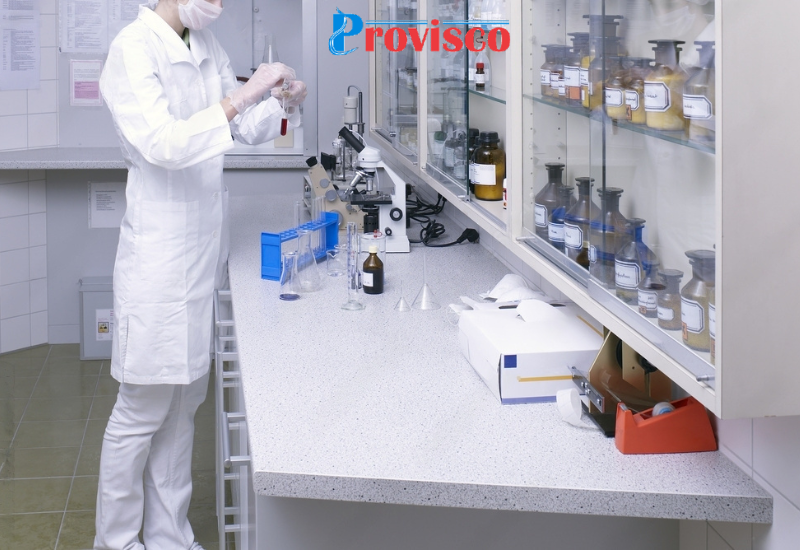Create a premier lab environment by choosing superior cabinets and countertops. Every piece of lab furniture is an investment that will yield long-lasting benefits. Choosing your furniture requires adequate product knowledge, a grasp of your lab’s objectives, and a budget to achieve the requirements. A reliable lab furniture manufacturer will furnish detailed and accurate information about the items. We have compiled materials popularly used in the design of laboratory cupboards and countertops.
Laboratory Cabinet
Laboratory Cabinets are a crucial piece of furniture that is used in every lab for the safe storage of items. The product design guarantees that valuables are kept in an organized manner. While certain cabinets are technically capable of containing dangerous chemicals. Cabinet locking mechanisms are capable of safeguarding your valuables against theft.
Materials Used in Laboratory Cabinet
The Materials used in laboratory cabinets vary based on the lab needs. Metal, wood, plastic, and stainless steel are all used to make cabinets. However, stainless steel cabinets are the most popular in the contemporary market.
Steel casework is good for a wet laboratory. The heavy-duty steel component assures durability and longevity. As they are chemical and moisture resistant they don’t corrode. It indicates that any kind of chemical exposure won’t harm them. They are likely to meet the conventional sterile or hygiene criteria. This factor is important, as you don’t want any kind of liquid or microorganism to penetrate and contaminate the environment. The interior shelves can be utilized for maximum storage benefits. Such cabinets are easy to clean and maintain.
The disadvantage of stainless steel is that it is expensive. They are susceptible to scratches and collect dust and stains.
Laboratory Countertops
Lab countertops serve as a work surface to carry out all kinds of research and experiments. They are pedestals built to withstand harsh working conditions.
Materials Used in Laboratory Countertops
Phenolic Resin
Phenolic Resins countertops are robust and lightweight manufactured by layering Kraft papers saturated with Phenolic Resin and treated at high temperatures. They have excellent chemical and moisture resistance. The material doesn’t support the growth of any kind of bacteria or fungus. Can withstand heat temperatures up to 350° F. They are ideal for chemical, biological, clinical, and Analytical labs. The only drawback is that they are not flame-retardant.
Epoxy Resin
Epoxy Resin countertops are constructed of heavy-duty materials. They are resistant to harsh chemicals, water and moisture.No culture of fungi or bacteria can grow on them. So they guarantee a sterile workspace. Can withstand heat temperatures up to 350° F. They are flame retardant. They are ideal for Hospitals, Industrial testing, and Chemical labs.
High-Pressure Laminate
High-Pressuressure Laminate countertops are very appealing.s.They are durable and affordable. Can withstand temperatures of up to 275° F. They are recommended only for chemical-free and dry applications. The downsides are limited resistance to chemicals.. Not Fungal resistant. Can’t endure the harsh work atmosphere.
ESD Laminate
ESD Laminate countertops are constructed of high-pressure laminate with a carbon layer to dissipate static charge. They offer resistance to stains and chemicals. Custom-made shelves and accessories are available.ESD Laminate is ideal for use in workstations and labs where materials are sensitive to static and needs protection. The downside is that it is not resistant to moisture. Deep scratches cannot be fixed.
Stainless Steel
Stainless steel countertops are low-carbon steel which has a chromium and steel blend. They offer resistance to moisture and chemicals. and don’t rust. Bacteria and other germs can’t grow on them. Constant tolerance to heat exposure above 1500°F. Hospitals, pharmaceutical labs, clean rooms, and food testing which handle high temperatures and need sterile processing employ steel countertops. However, they are expensive.
Factors to consider when choosing lab cabinets and countertops
- The nature of the chemicals you plan to use
- Take into account heat exposure
- Your laboratory requirements
- Consider your budget
- Materials must be easy to clean and maintain
- Choose a material that enriches the appearance of your lab.
Laboratory cabinets and countertops are designed to store your valuables in an orderly manner and boost productivity. Materials used for lab furniture should be durable and long-lasting. All the materials have their benefits and certain drawbacks. Discuss with a Lab furniture specialist before making any purchases.


